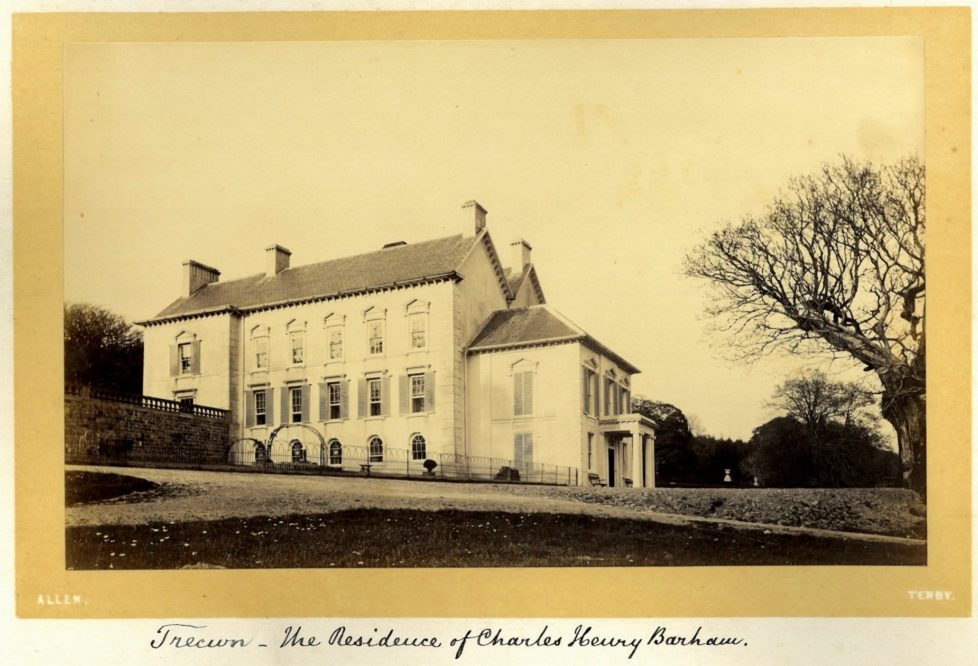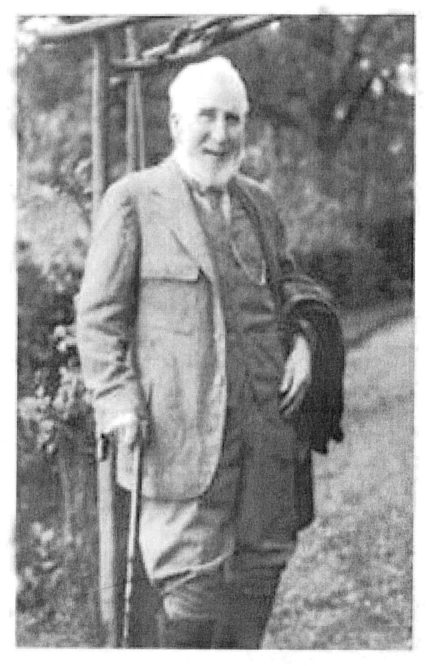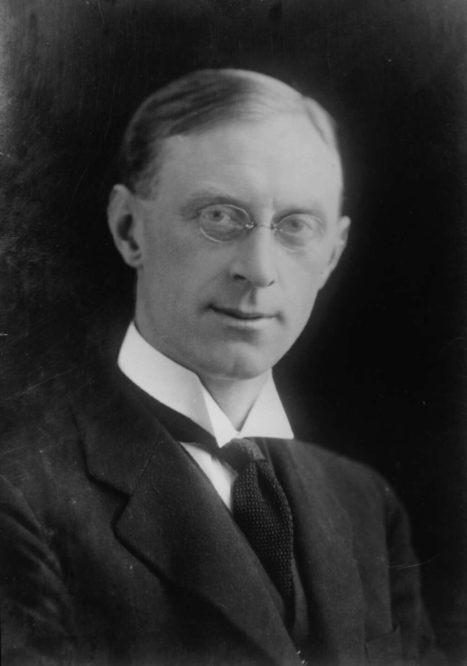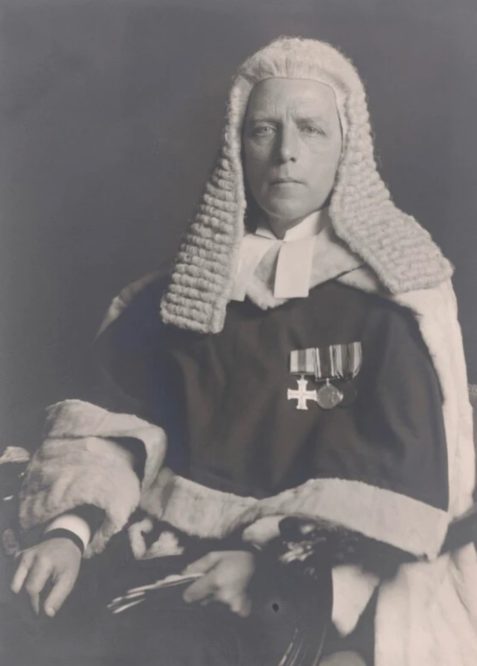House of Dogs: The Last Squires of Trecwn, Part 12 – Breaking Francis’ Will

We continue our series exploring the history of a Pembrokeshire estate and its colourful family.
Howell Harris
Cyril’s preparation for his challenge to his and his sisters’ disinheritance began at the same time as, and proceeded alongside, the perjury case. And it continued long after that had failed.
It involved solicitors in Fishguard and London, several barristers, and efforts to dig up witnesses who would support their eventual argument that their father had always lacked the mental capacity to make any valid will.

Francis’s Will: Continuity amid Change
The first problem was to work out precisely what Francis’s will of July 1912 and nine codicils 1913-1922 actually meant.
There was some initial hope that the sum of these eighteen single-spaced foolscap pages might be so contradictory and defective that, somehow, Cyril and his sisters could regain the status as their father’s heirs that they had lost between 1887 and 1912.
But this hope was quickly disappointed. The effects of Francis’s changes of mind might be unwelcome to his children, but that did not make them invalid.
Walter Williams had to advise his clients that the will and codicils “must come before the Court for interpretation”; there was no quicker or easier way to circumvent them, though Cyril continued, without success, to try to persuade his young cousins the Squires to withdraw their claim and create an intestacy.
There was in fact far more continuity in Francis’s dispositions than appeared at first sight — bequests to Ada Page and to other former servants changed little over time, and his great-nephews the Squire children were always his principal beneficiaries.
Most of the changes involved his choice of executors, but even there Henry Cundy was present from September 1915 and Jenkyn Evans from February 1918. And the will, together with almost all of its codicils, was competently and professionally drafted, so that their final meaning was not difficult for a couple of London barristers to disentangle.
The key changes took place in 1913 and 1917, and recorded unexplained family quarrels and an equally unexplained reconciliation.
Between July 1912 and April 1913 Francis’s executor and a major beneficiary was his distant cousin Thomas Foster Barham, a Somerset solicitor who was also serving as his agent.
In the event that none of the Squire great-nephews met Francis’s conditions for inheritance — changing their name to Barham, and their religion from Catholic to Anglican — Thomas and his children would replace them.
But this arrangement did not last long. In April 1913 Thomas was removed as executor and beneficiary, and two new executors, Francis’s old London solicitor Cato Worsfold and Percy Hughesdon, a Catholic man of letters, took his place.
Percy was Cyril’s wife (or “wife”) Mary’s older brother, and when their son Cecil was born in May his second given name was also Percy, presumably a mark of the siblings’ closeness.
Three months later Cyril and his children replaced Thomas Barham and family as the principal beneficiaries if none of the Squires cousins satisfied Francis’s conditions, but this reconciliation did not last long either.
Disinherited
In April 1917 Cyril and offspring were once again disinherited, and they stayed disinherited alongside his sisters thereafter.
The second counsel’s opinion that Cyril obtained reached a thoroughly pessimistic conclusion about their prospects of escaping the logic of Francis’s sustained or resumed hostility.
The barrister understood his and his sisters’ motivation — it was “only too obvious and is as old … as the time when the prodigal son’s brother complained of his father’s lack of appreciation.
A great theme no doubt from the humanitarian point of view but of little use in the Probate Court.”
Francis had anticipated their reaction in his “drastic and dramatic” April 1917 codicil which included the careful statement that he disinherited them “in full knowledge of my action.”
“It will be a difficult task to set aside these calm legal & orderly testamentary documents extending over a decade of time. It does not require much imagination to anticipate the President’s grim decision. ‘It may not be your will but it’s certainly the testator’s’.”
Cyril’s response to this bad news was to be predictably unimpressed, and to ask his solicitors to obtain better and different advice. But there is no evidence that they did, or could have.
Plan B: Damning Francis’s Reputation
Instead, he and they put more effort into an alternative strategy — not challenging the will and codicils on the basis of defects in drafting, having found that there were none significant, but a root and branch attack on them as the work of a madman and mental defective who was incapable of transacting any serious business.
The way this was done was by recruiting witnesses who had known Francis during or before his years of writing and changing his will, and would testify to his bizarre behaviour and lack of mental capacity.
Cyril’s local agent for this task was none other than his father’s old enemy David Bonvonni, who drove around the countryside contacting other people with good reasons to supply damaging testimony, including disgruntled former employees and tenants, people Francis had bested in court, even one of his former doctors whose bill he had refused to pay.
The resulting statements make interesting and sometimes amusing reading, but they were never tested in court, where they were instead buried beneath a mountain of contrary evidence from Francis’s friends.
But despite their obvious partiality and eventual forensic unimportance, perhaps they should not be dismissed altogether.
They present a portrait of Francis at a certain period of his life which is quite internally consistent and not incompatible with his friends’ later recollections of him. He comes across as the same odd man they described, but seen at his worst.
William Lewis, a local farmer and son of the tenants of one of the largest farms on the Barham estate, recalled frequent meetings with Francis from the years 1900-1914, not with hostility but simple exasperation: “On each occasion … it was absolutely impossible to discuss any business matter with him as immediately we touched on any subject he would introduce some other subject. He could not concentrate on any subject.”
This was clearly the same man that his lawyers bemoaned at the time for his inability to focus and therefore uselessness in the witness box.
Daniel Hughes
Daniel Hughes, another former tenant but much more hostile — he had sued Francis, unsuccessfully, for slander and other matters in 1907-8 — told a funny story about how he became a tenant in the first place. In 1901 he was living near Llanelli and applied for the tenancy of Pendouble, the Trecwn home farm.
Francis came down to interview him in person. Henriette St. Hilaire accompanied him on the train but travelled on, and asked Daniel to make sure to put Francis on the train home.
Francis wanted to see Daniel’s farm, about two miles from the station, and they set off to walk there. “He mostly talked to me about women and I could not understand him.”
When they were within quarter of a mile of the farm, Francis decided he wanted to go back to the station; when he reached the station, he wanted to go back to the farm. He did this twice. Finally Daniel put him back on a westbound train, doubtless relieved to be shot of him after eight wasted miles. But Francis got off again, and caught up with Daniel.
He said he was coming for a walk — I could not understand. He seemed very strange. He went about a mile and on the way he asked me if there were any ladies living near. I said there were two living near the farm and he asked if they would give references. I said yes they had already given them.
Then he asked if he could see them. I said yes, but after going a while I said we would lose the train so we went back. It was then about 6 p.m. and he had come about 2. This time I saw him in the train and pushed him in and I waited until the train had gone. He had said that perhaps he could stay with me.
According to Daniel Hughes, Francis was more than just eccentric, forgetful, and absent-minded, he was never “fit to do any business. I never thought him responsible and every one else who knew him said the same. Miss (sic) Miles [Henriette] did all the business.”
The most valuable evidence was provided by a couple of Francis’s local doctors. William O’Donnell, formerly Howard Owens’s partner in Fishguard, thought him “most abnormal mostly Sexual.” He did not elaborate on what he meant, but that was enough for Cyril’s lawyers to include it in the statement of their case for overturning the will in July 1927.
More detail was provided by Dr James Wilson of Haverfordwest, who had attended Francis and the women of his household, including one of his daughters, in 1907-8.
Sometimes I would be sent and when I got there Captain Barham did not seem to know why I had called and would talk about other matters in the most disjointed way, and I had to go back without knowing what I was sent for owing to the fact that he was so peculiar in his mind so that it was useless for me to approach the object of my visit at all.
He used to talk incoherently about the Scriptures, poetry, quote from Virgil and other Latin authors and Greek and would talk French in such a way that it was impossible to carry on a conversation with him.
His conversation was invariably of a rambling nature and he did not seem to be able to concentrate his mind on any one subject…. He was in my opinion incapable of transacting business of any kind…. He used to talk a lot of rot and drift from one subject to another in quite the most unaccountable fashion, the subjects having no relation to one another.
In my opinion he was not mentally normal at any time.
This and much else was the sort of anecdotal testimony that Cyril’s case against his father’s will would have to depend on.
Clash of the Titans: The High Court Trial
The case finally came before the High Court in London in March 1928. It was prosecuted by a heavyweight legal team of Norman Birkett, KC, and two juniors in support; Jenkyn Evans and the other executor, Henry Cundy, a veteran of the David Bonvonni assault case in 1916-1918, made do with Roland Oliver, KC and just one junior in defence.

Both barristers were outstanding criminal lawyers doing an increasing amount of the more remunerative civil work after taking silk three to four years earlier. Birkett was the more celebrated, and extraordinarily successful, his income rising from £16,500 in 1926 to £33,500 in 1929 [in modern terms, c. £3.3 to £6.9 millions] when, he told a friend, “I am making more money than I thought existed in the world.”
Cyril Barham certainly helped him towards his annual total for 1928, though Birkett could do little for his client, whose case was laughably weak. But Francis’s estate, worth £70,543, was worth the fight.
The essence of Cyril’s case was the assertion that Francis’s will of 1912 and its many codicils were invalid “on the ground that the instruments in question were not duly executed, that the deceased man did not know and approve of the contents, that he was not of sound mind, memory, and understanding at the material times, and that he had an insane hatred of his children and entertained an insane delusion with regard to his son” (that he had stolen a property deed).
Most of these assertions were not examined in the ensuing trial, but Roland Oliver had an effective answer to the crucial final two: Francis had had “no delusions, and … was of a sound disposing mind.”
He was “admittedly most eccentric” and “a most extraordinary man,” “full of whimsical ideas” but also “of violent and ungovernable temper, and of vindictive character, probably treasuring animosities for a very long time, though at times he forgave readily.”
Francis was “violent, passionate, … and supremely difficult to live with.” His will might be unjust to his children, but it was the product of a settled, rational hatred that deserved to be respected.

The trial stretched across five days, all of them taken up with the defence evidence of Francis’s friends, neighbours, and professional advisors, which Birkett was unable to undermine however hard he tried.
It simply piled up, making the vivid “eulogy” I wrote of in Part 9, a picture of an eccentric but quite sane old man who was completely alienated from his children for reasons that he found entirely sufficient.
Perhaps they were all the more inclined to speak for the defence because Cyril’s conduct towards Jenkyn Evans, Ada Page, and Sir Cato Worsfold in 1927 had demonstrated that he was as bad as his father had thought, and the last man they would want as a neighbour in their quiet, sociable backwater.
But on the fifth day, before the court had begun to get into what Birkett called “Really vital matters … of a controversial nature which would have necessitated opening up the relations between the plaintiff’s mother and father,” the parties settled.
Why Settle?
Birkett, having failed to dent the defence witnesses’ testimony, can have had little hope that calling some of his own would overpower it.
Walter Williams was still rounding up potential witnesses to Francis’s eccentricity, his fits of violent anger (against barking dogs at church, or English woodcutters on his estate), and his alleged madness — wandering around the fields aimlessly without coat or waistcoat, wordless or apparently foaming at the mouth; tapping his head with his finger and saying nothing when encountered outdoors “in a pitiful condition” and asked how he was and did he need help.
But it was not enough. Of his star witnesses, Daniel Hughes was bedbound in Fishguard and Dr Wilson, in his early 70s, had deteriorated so much between making his statement in February 1927 and the trial a year later that he could not be called either.
He could neither remember nor confirm what he had said, and, very inconveniently, he had also signed a later statement useful to the defence, if they ever got hold of it (it was not disclosed): that he had not seen Francis professionally for many years and though he “did not consider him quite normal … I did not see anything in him to lead me to think he was not capable of making a Will.”
The principal beneficiaries of the 1912 will, the children of Francis’s niece Clare (Gertrude, Adrian, and Lawrence Squire, b. 1904, 1906, and 1910), had problems of their own.
To inherit they had to meet two conditions: change their name to Barham, which it was reported that they had already done by the time of the trial, though if this was the case it was only temporary as they reverted to Squire after it; and abandon their Roman Catholicism and become Anglican, which they would not.
They thus had every incentive to make a private settlement with Cyril and his sisters so that they could all get a share of what was left of the c. £70,000 estate without any more public embarrassment and expense.
Step One was to accept the 1912 will and codicils, so that the estate could go to probate; Step Two to transform their effect by private arrangement.
The judge estimated that they had saved about a fortnight’s extra court time, which would have racked up Cyril’s and the executors’ legal bills enormously and further depleted the estate, as well as inflicting even more damage on Francis’s and the family’s reputations.
The historian and the prurient reader might wish that more dirty Barham washing could have had a good public airing, but the family obviously did not share our interests.
Given both parties’ uncertainty about their prospects of winning — Cyril or more likely Birkett because of the weakness of his case, the Squires because even a costly victory would have forced them to follow a course that they could not take in good faith, or to lose everything if they would not — a private settlement was the best outcome for all concerned.
But it took several expensive days in court, after more than a year of costly preparation, to get them to appreciate the fact.
In next week’s instalment we will follow Cyril into court again, on an even less successful quest for what he thought of as vindication which would turn out to be his last.
Support our Nation today
For the price of a cup of coffee a month you can help us create an independent, not-for-profit, national news service for the people of Wales, by the people of Wales.





